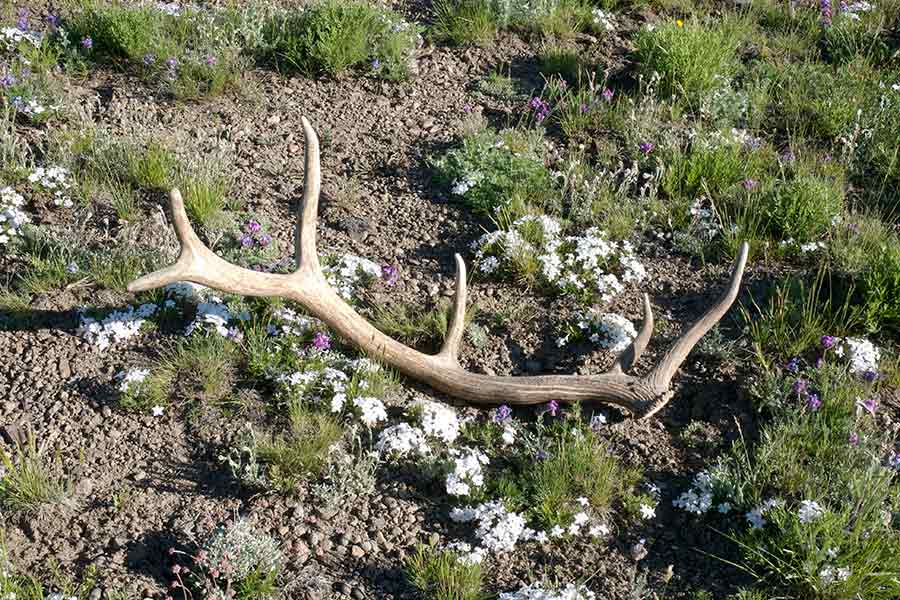Below is a news release from the Utah Division of Wildlife Resources. Be sure to check with your state before going out as many states have different regulations.
Collecting shed antlers from many big game species, including deer, elk and moose, is a popular pastime in Utah. But before you head outdoors to collect shed antlers during the next few months, you are required to complete the 2024 Utah Division of Wildlife Resources’ Antler Gathering Ethics course.
After dropping their antlers each winter, male deer, elk and moose will grow a new set of antlers starting in spring. Looking for the shed antlers is a fun activity that many Utah families enjoy. However, late winter and early spring are a tough time of year for deer, elk and moose, which is why the educational ethics course is required if you want to go “shed hunting” between Feb. 1 and April 15.
“During winter, big game animals, especially deer, often have a difficult time finding food,” DWR Once-In-A-Lifetime Species Coordinator Rusty Robinson said. “As a result, they often survive on fat reserves they have built up prior to winter. If the animals receive constant pressure from people and repeatedly have to run or move, they use up the fat reserves and energy they need to make it through the winter. Being disturbed briefly once or twice isn’t too significant, but we have over 20,000 people who routinely shed hunt in Utah each year, so ongoing, repeated disturbances can be detrimental to deer.”
From late winter through early spring, the habitat that big game animals rely on is usually wet, which means it’s more at risk for damage. The free antler gathering ethics course can help you learn how to minimize stress to wildlife and also how to avoid damaging their habitats during this critical time of year.
Completing the course is mandatory if you want to gather shed antlers from Feb. 1 through April 15, and the course must be completed each year. However, if you wait until after April 15 to gather antlers, you don’t need to complete the course. You can find the free 2024 course on the DWR website. About 20,000 people take the mandatory course each year to look for shed antlers in Utah.
After you finish the course, you must either:
- Store the certificate of completion in the DWR Hunting and Fishing app
- Print your certificate of completion and carry it with you in the field while “shed hunting”
Completing the course and having the certificate of completion with you allows you to gather antlers in many locations across Utah. However, some notable exceptions include:
- Wildlife management areas: Many of the state’s wildlife management areas are closed in the winter and spring to protect animals and their habitat. Make sure to double check for any closures before entering a WMA to gather shed antlers. You can find a list of Utah’s wildlife management areas and any seasonal closures on the DWR website.
- Private property: You must have written permission from the landowner before gathering antlers on private land.
- Native American lands, national parks and many national monuments are also closed to antler and horn gathering.
Reporting “deadheads”
If you find a skull with the antlers or horns still attached (often referred to as a “deadhead”), it’s possible the animal was poached. Do not pick up or move the skull or disturb footprints or other evidence at the scene. Instead, you should report it through the Utah Deadhead Reporter app, which was released last year to increase the efficiency of those reports.
You will need to download the app when you have cellphone service, but once it is downloaded, a report can be submitted from the field even without cellphone service. To submit a report on the app, you will need to include:
- Your DWR customer ID
- A GPS location of the skull
- Photos of the animal and surrounding scene
- Other important details
In many instances if it’s determined that the animal died of natural causes or other non-suspicious circumstances, conservation officers will often let the person who reported the find keep the antlers.
In 2023, 665 reports were submitted through the Utah Deadhead Reporter app.
The DWR recently formed a committee to examine shed antler gathering in Utah. The DWR’s official proposals for the shed antler gathering rules will be presented at future public meetings later this year to gather public comments. Any potential changes that may be approved by the Utah Wildlife Board wouldn’t be implemented until 2025. Some of the proposed changes require legislative approval and were recently introduced in a legislative bill. If passed, those changes wouldn’t be in effect until July 1, 2024.
For more information about gathering shed antlers in Utah, call the nearest DWR office.
(Photo credit: Utah Division of Wildlife Resources)
